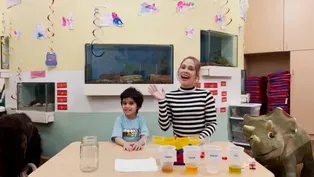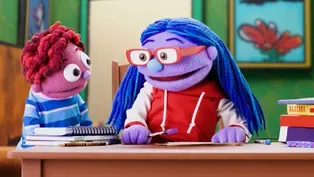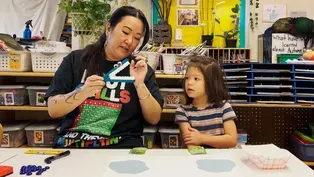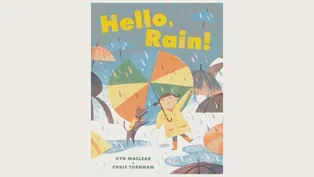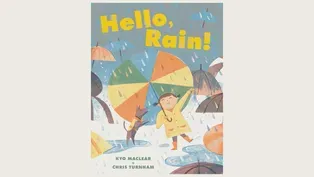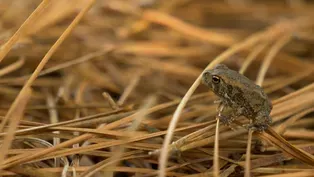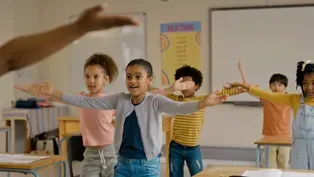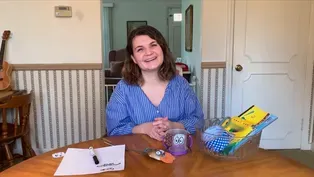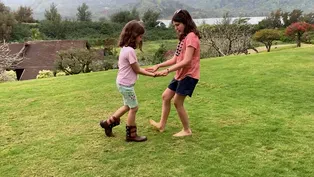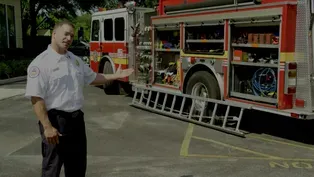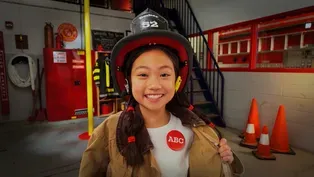
LONG U: U, EW, UE
Clip: 7/18/2024 | 8m 3sVideo has Audio Description, Closed Captions
Learn different ways to spell words with the long "u" sound with Anna Scretching-Cole.
Learn about different ways to spell words with the long "u" sound with Anna Scretching-Cole. Examples include "few," "pupil," and "rescue." Practice reading, blending, writing, and building words with the long "u" sound.
See all videos with Audio DescriptionADProblems with Closed Captions? Closed Captioning Feedback
Problems with Closed Captions? Closed Captioning Feedback
Let's Learn is a local public television program presented by THIRTEEN PBS

LONG U: U, EW, UE
Clip: 7/18/2024 | 8m 3sVideo has Audio Description, Closed Captions
Learn about different ways to spell words with the long "u" sound with Anna Scretching-Cole. Examples include "few," "pupil," and "rescue." Practice reading, blending, writing, and building words with the long "u" sound.
See all videos with Audio DescriptionADProblems with Closed Captions? Closed Captioning Feedback
How to Watch Let's Learn
Let's Learn is available to stream on pbs.org and the free PBS App, available on iPhone, Apple TV, Android TV, Android smartphones, Amazon Fire TV, Amazon Fire Tablet, Roku, Samsung Smart TV, and Vizio.
Providing Support for PBS.org
Learn Moreabout PBS online sponsorship[bright music] What have you been up to today?
Oh, that sounds like fun.
Well, I have been stuck inside because it's raining where I live so I've spent most of the day just listening to music.
But that's actually kind of perfect because I wanted to review a sound today.
Do you wanna review that sound with me?
Great.
So I was going to review the long "U" sound, like you hear in the word music.
So today we're gonna review the long "U" sound.
U, pupil, U.
Can you say that?
Yeah!
So there are actually three ways that we're gonna focus on making that U sound.
So the first way is we're gonna actually use the letter U to represent that U sound.
Now there's something really specific and special about when U is making a sound.
It can't be closed in or covered by other letters.
So for example, if I put a word like this, right here, U is not gonna be able to say its name, right?
Right here it's gonna make it short sound.
So it's gonna say "uh," and that's not what I want.
So let's think about the word music.
I was telling you how I was listening to music today.
So watch as I write the word music.
Mu-sic.
Now, how many syllables are in music?
Can you clap that for me?
Right.
Mu-sic.
Notice how I hear that long U sound at the end of that first syllable.
Well, that's why we're able to put the letter U there because it's what we call an open syllable.
So this is why it says music, not musik.
Okay?
How about the word pupil?
So pupil like the pupil in your eye or in this case, pupil is a student like you.
So if I were gonna spell the word pupil, well, let's figure out those syllables again.
Pu-pil, so there's two.
So pu-pil.
So for the pu part, I'm gonna need p. And then U gets to say its name, pu.
And then I'm gonna add the ending 'cause I'm gonna give you that part.
So pu-pil.
Pupil.
All right, let's try one more.
This is actually my daughter's favorite word.
The word is unicorn.
How many of you like unicorns?
They're pretty cool.
All right, so when I think of the word unicorn.
U-ni-corn.
Okay, this one has u-ni-corn.
Okay, it has three syllables.
Now that first syllable is what sound?
Great, U.
So what do you think is representing the U sound in unicorn?
That's right, you're so smart.
The letter U.
Okay, I'm gonna give you the rest.
So u-ni-corn.
I love it.
Unicorn.
Okay, so that's one way we can make that U sound.
Now, another way we can make that U sound, and I'm gonna put the U here so we don't forget about it, is if we use E-W. Now what's special about this is when you hear U at the end of a word, one of the ways it'll be spelled is E-W.
So for example, if I said the word few, like I only have a few more snacks left.
Oh, bummer.
All right, so for few I would start with that f sound.
So f. And then the U sound is being created by E-W. Few.
Well, if you can spell few, you can spell pew.
So if you've ever been to church or sat on a long bench, sometimes they're called a pew.
So how would I turn few into pew?
F-ew, p-ew.
That's right, I need to change that initial sound.
So it's no longer going to be f, it's now going to be p. Well, what letter represents that p sound?
Oh yeah, thank you!
P. So p-ew.
Pew.
All right, let's do one more.
How would I turn pew into mew?
Like the sound a cat makes.
To mew.
So thinking, what's changing pew, mew.
That's right, it's that initial or first sound again.
So how would I turn p into m?
Awesome.
So the P would turn into M and then I would still add my ew.
Mew.
Let's read the three words together.
We have few, good.
Pew, mew.
Okay, I'm gonna add that second spelling of U over here.
Now let's do the last one.
You're doing such a great job.
Okay, the last way we're gonna talk about making that U sound is U-E. Now this also usually appears at the end of a word.
So a great example of this word I like to think of is rescue, like when someone tries to save you, rescue.
So watch how I spell rescue.
Res-cue.
Okay, so you see my U-E at the end of the word.
What about the word argue?
Okay, so I'm gonna give you the first part.
Ar-g. Now, how do you think that U is going to be spelled here?
That's right, U-E. Now I see some of you looking at me like, "Hey Anna, but how do I know which U to use at the end?"
Well, this comes with exposure.
That means the more you see these words and the more you read these words and the more you write these words, you're gonna figure out which correct spelling of U goes with which word.
But let's practice a little bit.
I have some words that are gonna appear on the screen and I want you practicing first reading the words and then for the second word, trying to figure out which U spelling would you use for the words.
Okay, good luck.
Remember, we are reading U, U-E, and E-W as the long U sound.
U.
Read the words on the screen.
Hopefully you said music, few, and argue.
Which spelling for the long U is needed to complete each word?
Pupil.
Mew.
Rescue.
Wonderful job, scholars.
You did an amazing job working with our three spellings of long U, U, E-W, and U-E.
Remember, the way you're really gonna master these words and the spellings is through practice.
So practice reading them and practice writing using them.
Well, until next time, friends, bye!
Video has Audio Description, Closed Captions
Clip: 7/18/2024 | 8m 18s | Compare the density of water to that of different liquids. (8m 18s)
FEEL YOUR BEST SELF: FEEL IT TOGETHER
Video has Audio Description, Closed Captions
Clip: 7/18/2024 | 3m 54s | Learn a strategy called “Feel it Together” to share sad feelings with supportive friends. (3m 54s)
Video has Audio Description, Closed Captions
Clip: 7/18/2024 | 8m 10s | Zoe Kleinmann plays a math game with a “gator” to learn about less than/greater than. (8m 10s)
Video has Audio Description, Closed Captions
Clip: 7/18/2024 | 6m 19s | Anna Scretching-Cole reads HELLO, RAIN! by Kyo Maclear. (6m 19s)
Video has Audio Description, Closed Captions
Clip: 7/18/2024 | 6m 19s | Anna Scretching-Cole reads HELLO, RAIN! by Kyo Maclear. (6m 19s)
Video has Audio Description, Closed Captions
Clip: 7/18/2024 | 2m 43s | Meet Houston toads hatched from eggs that transformed into tadpoles and then tiny toads. (2m 43s)
Video has Audio Description, Closed Captions
Clip: 7/18/2024 | 2m 21s | Sing “Let’s Move It!” with Flor Bromley. (2m 21s)
Video has Audio Description, Closed Captions
Clip: 7/18/2024 | 3m 33s | Make tabletop puppets using household objects with Renata Townsend from New Victory. (3m 33s)
MAYANA TEACHES THE HEEL-TOE POLKA
Video has Audio Description, Closed Captions
Clip: 7/18/2024 | 1m 1s | Mayana from Dancing Classrooms teaches the heel-toe polka. (1m 1s)
Video has Audio Description, Closed Captions
Clip: 7/18/2024 | 2m 52s | Meet a firefighter! Learn about the ways firefighters are helpers. (2m 52s)
WORDSVILLE: THE CASE OF THE CAKE COMMOTION
Video has Audio Description, Closed Captions
Clip: 7/18/2024 | 7m 27s | Baker Graham's "celebration" cake has gone missing! (7m 27s)
Providing Support for PBS.org
Learn Moreabout PBS online sponsorshipSupport for PBS provided by:
Let's Learn is a local public television program presented by THIRTEEN PBS
